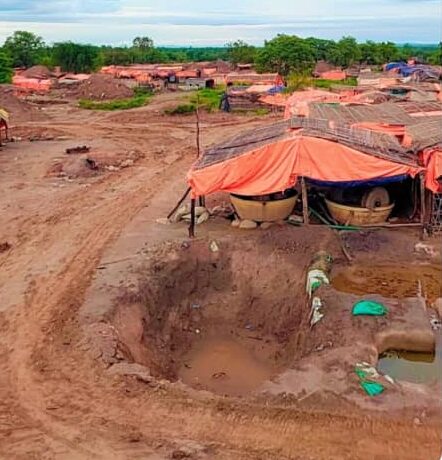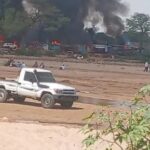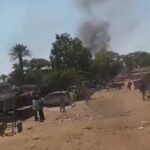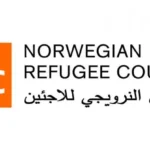Darfur follow ups : report
The Sudan office of the Center for International Private Projects have revealed the corruption networks that support the war economy in Sudan.
The director of the center, Shaza Bala, said in statements obtained by Darfur Follow-up that these networks have interests in the war economy, such as arms trade, mining, and gold extraction, which currently represents the primary source of funding for both parties of the the war.
She confirmed that the revenues from gold, for which Sudan is considered the third largest African country to produce, today go mainly into the pockets of the military establishment and the rapid support force.
She said that the ban imposed by the American government in the period from May to August on the Marawi Gold and Al-Junaid companies operating in gold mining was not surprising, and in this regard, she referred to discussions currently taking place within the European Union to impose a ban on companies working to support the war on both sides.
In this context, average purchasing power has declined and the incomes of ordinary Sudanese have decreased by 50 percent since the outbreak of war between the army and the Rapid Support in mid-April.
This decline in purchasing power, along with the decline in per capita income, has led to 2 million Sudanese since the beginning of the war, joining about 26 million other Sudanese who have been living below the poverty line sincethe 2019, according to reports from the Bank of Sudan.
Shatha Balla, Director of the Sudan Office at the Center for International Private Projects, described the decline that occurred in purchasing power as expected, but in return she pointed to the continuation of the meager commercial activity accompanying the war and said that the Sudanese currency has become worthless and its value has declined significantly at a difficult time for even getting hold of paper currency.
In this regard, Shatha predicted that a disaster would occur in Sudan if the Bankak application stopped working, as a single financial transaction window in Sudan as there was no cash flow for circulation.
On the other hand, the Al-Junaid Support Company is still working during the war in mining areas in the state of South Darfur.
One of the miners from the Agbash mine in the Songo region “Which is about 213 kilometers southwest of the city of Nyala, the capital of South Darfur State, which contains the 7 largest gold mines in Darfur” , who preferred to withhold his name, mentioned that the Al-Junaid Company in the mine has an airstrip that operates from and to the governor of Central Africa, and throughout the fall period the company was buying from the miners. Gold is currently selling for a low price, which has forced many of them to go to the city of Wau in South Sudan to trad.
The same source indicated in an interview with Darfur Follow-up that throughout the war period, the gold mines in the Songo region were operating and feeding the local market in what he considered to be a case of failure to control the quantity of the local product of gold that the company buys.
Amid complaints from miners in the mines, a large number of mining wells were closed in the Kisra, Daraba and Jombana mines.
According to Abdullah Inglis, who works as a goldsmith in the Singu region, miners are forced to sell gold for quick support due to the closure of local sales outlets and the scarcity of cash flow in the region.
A report on the Global Witness website reveals a number of original documents, outlining the features of the financing network that supports Hemedti and the Rapid Support Forces.
Not only did these forces seize control of a large portion of the country’s gold industry through a company linked to them, but leaked bank data shows that they used a number of companies as a front, and banks in Sudan and the United Arab Emirates to conduct their business and complete their purchase deals.
The network verified the authenticity of the documents through personal interviews, company records, and open source investigation methods, including analysis of site infrastructure information. Accordingly, she was certain of the authenticity of the documents.
Documents published by Al-Bashoum TV show that the Rapid Support Forces purchased approximately (1,000) Toyota pickup trucks, which were easily converted into combat vehicles carrying machine guns, which the Rapid Support Forces used in their ongoing war throughout the country.
Besides payments to Sudanese fighters in Yemen, one of the main sources of income for the RSF is a major gold trading company called Al Junaid Metal Trading. It appears that through these two sources, Hemedti was able to control a large part of the gold trading market in Sudan, and the support also uses companies and bank accounts in the United Arab Emirates and Sudan to receive financing.

Funding for the Rapid Support Forces is not subject to either the Sudanese army or the civilian elements of the country’s government. Leaked documents show the RSF holding an account in its name at National Bank of Abu Dhabi (now part of First Abu Dhabi Bank).
This represents evidence of the financial independence of the Rapid Support Forces. But the official spokesman for the Sudanese army denied that the Rapid Support Forces had a separate budget from the budget of the Sudanese Armed Forces
Darfur’s investigations also found that the Taradive General Trading Company, owned by Hemedti’s brother, is a financial front that leaks money to the Rapid Support Forces.
The leaked documents show the transfer of money back and forth between the company’s account and the Rapid Support Forces account. The company received approximately 50 million dirhams ($11 million) from the Rapid Support Forces, in four instalments between April and July of this year.
Another report stated that the Rapid Support Forces account received an amount of (48) million dirhams ($11 million) from the Tradive company. Darfur Follow-up viewed information from the Ministry of Economic Development in Dubai confirming that Al-Qouni Hamdan Dagalo, Hemedti’s brother, owns the company and is its primary beneficiary.
One document states that the reason for transferring funds from the Taradive account to the Rapid Support Forces was a transfer “to a sister company.” This makes it more likely that Taradive is a financial front for the Rapid Support Forces, leaking money into the account of these forces, and from there to complete commercial transactions without the Rapid Support Forces being directly and explicitly involved.
In an interview with one of the actors gathered in the city of Nyala, the capital of South Darfur state, he mentioned that, as an eyewitness, an airport was established in the Umm al-Qura area of the Rapid Support Forces during the clashes between the army and the Rapid Support Forces before the fall of the 16th Infantry Division. This airport is used to receive Emirati planes coming from Libya and Chad via the airport Um garas .
After the fall of the 16th Division in Nyala, all the forces that were fighting in the city were replaced by another force brought by Rapid Support from the Emirates and Libya.
He pointed out that the total number of forces that arrived in Nyala after the city fell into the hands of Rapid Support was estimated at about 12,000 soldiers from different ethnic backgrounds, and that the majority of them were students. Universities were recruited after the start of the war in Khartoum.
Previous reports published on the Darfur Follow-up website indicate that the Rapid Support Forces attracted a large number of rural children to join the forces in their battles against the Sudanese army, and the most tempting offers to join them were promises made by the Rapid Support Forces to the native administration and notables in the form of money or promises of civilian positions after the war for the administration to use. The native administration has the power to bring in many fighters for the RSF.
Darfur Follow-up also conducted an interview with a young man who was active in theatre and civil society. He stated that he was on his way to Khartoum for war and to take the spoils, and his justification was that he had no thing to do and all that remained for him was to fight the war to make a living and support his family.
According to information, the Rapid Support concluded huge deals to import weapons from Eastern Europe and some European and American weapons under the cover of intermediaries in the black market for weapons.
The Rapid Support Forces received batches of “bilateral and quadruple” antibiotics in November and December 2021, according to a member of the Sudanese army’s military intelligence, according to (Sudan Tribune), on the condition that his name not be mentioned.
There were reports that the Rapid Support had about 10,000 four-wheel-drive vehicles, some of which were armored and equipped with light and medium machine guns.
Several reviews held by the Rapid Support Forces on special occasions revealed that they possess armored vehicles, artillery, shields, anti-aircraft guns, and weapons.
The Rapid Support Forces received a limited set of Drones from the forces of retired Libyan Major General Khalifa Haftar, and armored cars, according to the intelligence source, but Rapid Support Commander Hemedti said in a previous audio recording that his forces obtained marches from army stores.
Reliable information from a former military official who spoke to Darfur Follow-up indicated that the Rapid Support Forces were using a drone made in Serbia and equipped with 120 mm mortar bombs, which appeared in the airspace of the capital last June, and attacked the General Command Corps and the Armored Corps.
The Rapid Support Forces own armored cars manufactured in Europe, which they used to monitor illegal immigrants on the border with Libya and transported them to El Fasher and then Khartoum last April.
During the ongoing attack on the Armored Corps south of Khartoum, the Belarusian “Cayman” armored vehicle and models of the Sarsar 4 and Sarsar 5 armored vehicles, which were manufactured locally, appeared with the Rapid Support, which reflects a new shift of forces in the arming process during the war.
According to retired officer Brigadier General Abdel Moneim, in his speech, the Rapid Support Forces sought to use the VN4 armored vehicle, which is a Chinese armored vehicle and the Type 96 tank, which are produced locally by the army through the defense industries system.
In this context, the American newspaper “The Wall Street Journal” revealed in a report that the United Arab Emirates provides military support to the Rapid Support Forces.
The newspaper said that an Emirati cargo plane landed at a Ugandan airport at the beginning of last June, and it was confirmed that it was carrying weapons and ammunition, at a time when official documents showed that the plane was carrying Emirati humanitarian aid to Sudanese refugees.
On August 14, the UAE denied that it was siding with either party in the war in Sudan, or that it had supplied weapons and ammunition to one of the parties in the war there.
The Emirati denial came after press reports that Abu Dhabi provided significant military support to the Rapid Support Forces.
In a report dated December 30, published by the Darfur Network for Human Rights on its official website, it was stated that at noon on December 26, 2023, in the Yara area located about 30 kilometers north of Nyala in South Darfur State, a military transport plane with four turboprop engines, No. (130C Hercules), landed from the United Arab Emirates via Chad. Ammunition boxes and loaded gold boxes were lowered and unloaded. Upon takeoff from the airstrip, the plane headed east.
According to the report, eyewitnesses saw people handing over all of the goods from the plane to the Rapid Support Forces officer, who was already waiting for the plane to land. One of the workers who helped unload the cargo confirmed to the Darfur Human Rights Network that the C-130 (Hercules) military plane contained three military marches, 123 boxes, and many other boxes, as quoted by him.

Networks that support the war economy in Sudan
According to a report dated July 20, 2023 published by Sky News, the following companies targeted by British sanctions that work to directly finance both sides of the war:
Al Junaid Company
It is a large conglomerate owned by the Rapid Support Forces and established by the Commander of the Rapid Support Forces, Mohamed Hamdan Dagalo “Hemedti.”
This company provided at least tens of millions of dollars in financial support to the Rapid Support Forces, enabling them to continue the conflict, according to the source.
GSK Advance Company Ltd
A major front company owned by the RSF, and provides some funding to the RSF to support the purchase of materiel.
Tradive General Trading Company
It is a company linked to the Rapid Support Forces, which provides them with funds and equipment such as vehicles modified with machine guns for the Rapid Support Forces to patrol the streets.
Companies associated with the Sudanese army:
Defense Industrial Systems (DIS)
A a large conglomerate owned by the Sudanese Armed Forces, which provides some financial resources for the Sudanese army to continue fighting. The Defense Industries System has more than 200 companies and makes profits of $2 billion annually.
Sudan Master Technology Company
A Sudanese company that works in the field of selling weapons and has close commercial relations with the Defense Industries Company, the economic and manufacturing arm of the Sudanese Armed Forces, which supplies it with funds and equipment.
Zadna International Investment Company Limited
One of the DES companies owned by the Sudanese Armed Forces
The strategic expert and political analyst, Dr. Omar Al-Raddad, explained that the ongoing war in Sudan revealed the issue of the importance of gold and its exploration in this country. He considered that gold was one of the main reasons for the outbreak of war between the army and the Rapid Support Forces and the dispute that occurred between them.
For his part, the researcher in international relations and political economy, Abu Bakr Al-Deeb, explained that the wealth of the Sudanese people is being exploited in the current conflict between the army and the Rapid Support Forces.
Al-Deeb said: “Sudan is one of the most important gold producers on the African continent and the thirteenth among the gold-producing countries in the world.
Both sides of the conflict are trying to control the yellow metal, which has made Sudan one of the poorest countries even though it is floating on a sea of wealth and has gold reserves up to 1,550 tons.” The gold industry in Sudan also provides enormous resources and wealth that is smuggled abroad to be spent on the ongoing war.
Al-Deeb adds: “The value of the proceeds of gold production in Sudan, with current capabilities, amounts to about $5.5 billion annually, of which $4 billion is being looted for the benefit of the conflicting parties.
Gold mines are located in the deserts and mountains east of the Nile River, along the Red Sea and at the top of the Red Sea mountain range.” And also in the Nuba Mountains, Kordofan and Darfur regions.
However, the expansion and continuation of the war will inflict great losses on the Sudanese economy and the state treasury and increase average inflation rates, which have reached 700 percent, and Sudan will lose $2.5 billion in gold revenues.
“Whoever has the gold must continue the war.”
A former American diplomat stressed that “those who have gold and financial resources coming from neighboring countries must continue the war.” Ambassador Tibor Nagy’s statements bring back to the forefront the issue of financial resources that finance the war currently taking place between the two military leaders, specifically the issue of gold and Sudan’s wealth.
In terms of numbers, Abu Bakr Al-Deeb indicated that Sudan “produced up to 18.6 million tons of gold in 2022, an increase of 611 kilograms over 2019, but this represents only 50% of the total production, as the other percentage that is produced illegally disappears.” he production of the Hasai mine alone since its discovery has reached about 14.09 million tons of gold.
Al-Deeb adds: “The value of the proceeds of gold production in Sudan, with current capabilities, amounts to about $5.5 billion annually, of which $4 billion is being looted for the benefit of the conflicting parties.
Gold mines are located in the deserts and mountains east of the Nile River, along the Red Sea and at the top of the Red Sea mountain range.” And also in the Nuba Mountains, Kordofan and Darfur regions.
However, the expansion and continuation of the war will inflict great losses on the Sudanese economy and the state treasury and increase average inflation rates, which have reached 700 percent, and Sudan will lose $2.5 billion in gold revenues.

“International companies acquire Sudanese gold”
Abu Bakr Al-Deeb also said, “Sudan’s gold is characterized by very high concentration rates, as each ton of extracted ore contains 100 grams of gold. There are international parties working to steal Sudan’s wealth in the absence of international law.” He explained that the 423 companies operating in the field of gold exploration in Sudan “occupy about 300 square kilometers of concession areas, in addition to what is produced informally.”
For his part, Al-Raddad said, “Sudan produces more than 100 tons of gold annually, of which only 30 tons go to the state treasury, while the rest is shared between the two powerful men in the country, through five or more than five companies working in the field of gold exploration, following these steps.” Companies from China, Russia, Italy, and other countries.
But what is striking is that Russia operates along two parallel lines: Russian companies affiliated with the government and others affiliated with the Wagner Company, and the latter appears to be one of the reasons for the dispute as well. This hypothesis is supported by the fact that the majority of this gold is transported after it is extracted: to Russia, and also to the United Arab Emirates, which has close relations with Sudan, whether with the army or the Rapid Support Forces.
The relationship of Russian intelligence with rapid support
Wagner mercenaries also support the Rapid Support Forces, through an airport in the Songo area at the headquarters of the Al-Junaid Company, which receives the Rapid Support military equipment and supplies the Wagner group with gold that is transported to Central Africa.
Wagner has been also working on training the Rapid Support Forces in the Umm Dafouk locality on the border with the Central African Republic since the fall of the Joint Forces Command and the Sudanese Army in June 2023. Some weapons are also sent from Umm Dafouk via the land road linking Umm Dafouk and Idd al-Fursan locality to reach Nyala, and most of the weapons are Russian-made snipers.
Darfur conducted follow-ups with one of the refugees in the Birao refugee camp, fakaka locality in Central Africa. He said that every 12th of every month, large cars carrying Russian soldiers carrying wooden boxes that he had no idea were passing by, heading towards Umm Dafug.
Sudan has even become another rear base for them in the region as well as a source of funding for the Russian paramilitary group.
The gold mines belonging to the Hemedti family have signed contracts with companies that act as fronts for Wagner Chairman Yevgeny Prigozhin, according to the US Treasury Department.
In this regard, Alex De Waal, an expert on Sudanese affairs, told Agence France-Presse that “money and fighting are interchangeable in the Sudanese political market.” He added, “Hemedti trades in both.” He believes that “the Rapid Support Forces have now become a private, cross-border mercenary company, a company for extracting and selling gold, and the armed arm of Hemedti’s commercial empire.” If Hemedti wins the war, “the Sudanese state will become a branch of this transnational company,” according to the same source.
It is worth noting that the Wagner Security Group is actually managed by the Russian Intelligence Service (FCI) in close cooperation with the Russian Military Intelligence (GRU).
The Wagner Group worked in Sudan through the companies More Gold and M Invest) which ran its business from Khartoum and whose management was transferred to one of the states of Darfur, and which works in coordination through strategic partnerships for companies such as: Invest Sarlo and Diamville in the Republic of Sudan. Central Africa, from the capital, Bangui, and one of its branches in the state of Bembri.
Al-Tahir, nicknamed (Bendeen Mahamad), says that they were fighting in the ranks of the Seleka movement when the Rapid Support attracted them to join his forces with an agreement in February of the year 2023 to be the supporting force for the Rapid Support on the border with Central Africa.
After he returned to Sudan last February, he was promoted: from Handi in the Seleka movement in Central Africa, to the rank of lieutenant after he met with his peers with Abdel Rahim Dagalo in March in the city of El Fasher during the distribution of ranks to them.
They are now in the Umm Dafouk region working to deliver supplies from Central Africa to Khartoum by land via El Daein and then El Obeid.
He did not disclose the type of military equipment being transported to Khartoum, but rather said: “We are people who receive and deliver, and we do not have to do the rest.”
Hemedti meets a Russian intelligence officer returning to Central Africa on a secret mission
Darfur Follow-up obtained special information indicating that Valery Zakharov, former advisor to the President of the Central African Republic, and former Russian intelligence officer, returned with a top-secret operation to the Central African Republic in recent weeks. It is important to note that Zakharov is now subject to international sanctions, including from the United States.
Zakharov, who served as National Security Advisor to the President of the Central African Republic, Faustin Archange Touadera, visited the capital, Bangui, in October and November in complete secrecy, and stayed at the GM Residence hotel near the presidential residence, where he was spotted.
Zakharov, a former member of the Russian intelligence services, left the Central African Republic in June 2021 and is subject to US Treasury and European Union sanctions, both of which claim to be an executive at the Wagner Group.
His visit to the Central African Republic was motivated by economic and security concerns. In addition to the capital, Zakharov traveled to various mining sites in the countryside where the Russian paramilitary group has interests.
Zakharov’s deputy – who goes by the first name “Roman” – was also seen in Gordel, a sub-prefecture in the fakaja region. This mineral-rich region located in the far north of the country is witnessing fighting between armed groups and pro-government forces.
Zakharov was instrumental in Wagner’s arrival in the Central African Republic in 2018, and established himself as a key player at the Renaissance Palace, where he had an office next to that of the president.
He also managed relations between Bangui and armed groups, particularly regarding access to mines, and secretly coordinated the Khartoum peace agreements in 2018.
He was quietly absent in June 2021, after Touadera began his second term in office, in the midst of the Wagner campaign to eliminate the Seleka movement in Central Africa and its alliance with the Rapid Support Forces in Sudan.
Zakharov’s latest trip comes at a time when uncertainty surrounds the future of the Russian militia in the Central African Republic. Since the killing of Wagner’s founder, Yevgeny Prigozhin, and his right-hand man, Dmitry Utkin, in August, Russia has been keen to regain control over the group’s activities in Africa, especially in the Central African Republic.
In late November, Russia’s Deputy Defense Minister, Colonel-General Yunusbek Yevkurov, stopped briefly in Bangui and had dinner with the Russian Ambassador to the Central African Republic, Alexander Bekantov, but was unable to see Touadera, who was already in Dubai for the UN conference on Climate Change (COOP 28).
This official visit followed that of Colonel Alexander Fomin, who traveled to Bangui without meeting local Wagner representatives, Dmitry Siti and Vitaly Perfilev, both of whom are under US sanctions.
According to the All Ice on Wagner group, Pervilev was replaced by Denis Pavlov, an agent from the Russian Foreign Intelligence Service (SVR), who has a close relationship with Hemedti, as he is considered the Russian mediator between Russia and the governments allied with it in Central and North Africa, and the Sahel countries.
A meeting was held between him and Hemedti last December in N’Djamena, in which he discussed the reasons for strengthening the Russian role in the war taking place in Sudan now, and from there, Hemedti headed to Uganda.
Numerous reports in the American, British and German media focused on support operations provided by the “Wagner” forces to the “Rapid Support” forces led by Muhammad Hamdan Dagalo (Hemedti), from military bases in Libya (Al-Kharouba bases in the east and Al-Jufra bases in the south) under the control of Khalifa Haftar, which were monitored via Satellites show air transport operations and support for the “Rapid Support” forces with military equipment, missiles, training, and perhaps the transport of Janjaweed mercenary fighters who participated in 2019 with Haftar’s forces in the attack on the capital, Tripoli. Haftar’s forces denied taking sides in the ongoing armed conflict in Sudan.
The ambassadors of Britain and Norway and the US Chargé d’Affaires in Khartoum said in a joint statement on March 21, 2023 that the “Wagner” security group is also engaged in “illegal” activities, including media disinformation and gold mining in Sudan.
As the clashes ignited, on April 15, 2023, international media and sources reported that Hemedti’s forces were receiving weapons and technical assistance from Wagner, with whom it has close relations that amount to the coalition, and go back several years.
On April 23, 2023, the American newspaper “The Washington Post” published leaked American secret intelligence documents, indicating that the “Wagner Group” seeks to establish a “confederation” of anti-Western countries in Africa, and that in order to achieve this goal it is working to fuel conflicts, using paramilitary capabilities, in addition to the capabilities to spread false information, and in doing so it strengthens Moscow’s allies on the continent.
On April 24, 2023, Finnish Foreign Minister Pekka Haavisto confirmed that there are risks that the Russian “Wagner” group will benefit from the current crisis in Sudan. Haavisto said, “It is not fair for all foreigners to leave the country in these circumstances.” “If we leave, we also leave some room for Wagner’s forces and Russia to play this game.”
Given the official Russian statements, according to the founder of the “Wagner” group, Yevgeny Prigozhin, there have been no members of his company in Sudan for more than two years, but there are indications of the existence of interests for this company, or more precisely for Russia, because private military companies are a tool for carrying out certain state tasks without its direct involvement. Therefore, it is not unlikely that Russia has interests or even a presence through the “Wagner” group in Sudan.
Recently, attention was drawn to the statement of Russian Foreign Minister Sergei Lavrov, in a press conference at the United Nations on April 25, 2023, when he said that the Sudanese authorities have the right to use the “Wagner” group, as part of his response to accusations of the participation of mercenaries in Sudan’s battles.
Thus, the Russian official left no room for doubt about the validity of the information circulating about this matter.
Wagner forces were deployed in Sudan in December 2017 to provide political and military support to the ousted Sudanese President Omar al-Bashir. This came after Al-Bashir negotiated a series of economic and security deals with Moscow, to build a partnership that included, in particular, a group of gold mining concessions for the “Minvest” company, which is linked to “Wagner.”
What bothers Washington most is the security of the Red Sea, and therefore the presence of a Russian base in Port Sudan prompts it to take action to block this, and it has no choice but to end Wagner’s influence in Sudan. It began bringing rapid intervention forces and special forces to Djibouti.
It is clear that Washington will put its weight on Burhan’s side to resolve the war against his opponent, Hemedti, but there are no guarantees that this effort will succeed quickly. America may find itself involved in a civil war.

There is a Russian military presence in Central Africa neighboring Sudan, and Russia is looking to build a base on the Sudanese coast overlooking the Red Sea to increase its influence in the Horn of Africa and expand its presence in the Bab al-Mandab Strait.
The United States of America fears the increasing Russian or Chinese influence in Sudan, and it sees the possibility of their control over it as not only a warning of a potential threat to its interests in the region, but also an indicator that prompts it to reevaluate its interest in Sudan. For this reason, senior American military officials visited Sudan during the recent period.
The ongoing power struggle in Sudan will affect the future of the interests of the major powers in Sudan and Africa in general, especially the United States and Russia, which has so far been trying to exercise neutrality, awaiting clarification of the situation on the ground.
The Wagner Group is working to tilt the balance in favor of Russia in this conflict, especially since it is more present on the ground than others, and maintains military and security capabilities in Sudan that can be employed for the benefit of the Rapid Support Forces.
Wagner is likely to bring in more logistical support from its bases in Libya, the Central African Republic, Mali, and Burkina Faso. Libya constitutes the most important support station on the African continent thanks to the military bases it controls in the areas under the influence of retired Major General Khalifa Haftar.
Sudan will witness a state of potential competition to gain influence between the West and Russia, like many regions in Africa.
It enhances the possibilities of this intense race between the two parties to strengthen the presence in Africa at all levels since the beginning of the Russian-Ukrainian war on the one hand, and the continuing state of internal political incompatibility between the military and civilian components on the other hand, which forces Sudan to try to balance mutual interests with both parties are at this stage in a way that serves the Sudanese system of internal goals, which are primarily linked to finding a quick and effective solution based on adopting a balanced internal political formula between the effective internal parties to overcome the transitional stage.
If the conflict is prolonged and a settlement is not reached, it is possible that the parties’ accusations against each other – of helping other parties in the region – will become reality and turn into a long, intertwined and complex war.
The Sudan crisis should serve as a warning to Europe, which has yet to take steps forward towards a strong relationship with Africa, and understand that the destinies of the two continents are closely linked.








